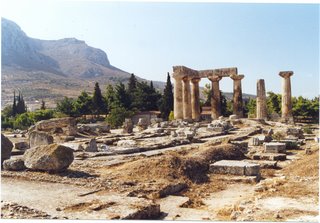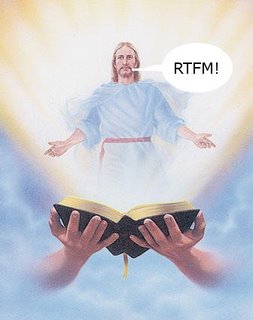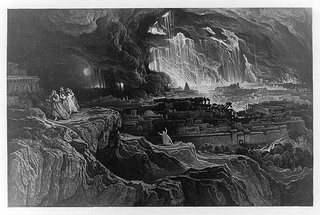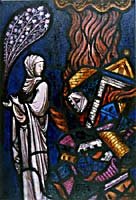The Equality Riders have made their visit to ACU and are now on their way to A&M. While I wasn't allowed to attend any of yesterday's sessions, I did get to have breakfast with Rebecca and a few others.
Within the next week, I'm hoping to have guest posts from a few Equality Riders, evaluating their visit. I'd also like to have posts from some of you ACU folks, so if you were there in the thick of the discussion, please volunteer.
Finally, a few visitors have commented on the earlier Equality Ride posts, and those are kind of buried now, so I'm going to pull their posts up here so that you can read them. (By the way, frenchpress, it's fabulous to hear from you. I'll be perusing your constellation of links as soon as I get the chance.)
frenchpress said...
according to this initial release seems it was a positive experience. i hope so.
thanks for all the info!
~t
anonymous said...
Soulforce has come and gone. And from my perspective both "sides" were blessed in an unexpected way. During a session called "Letters to Mel," students talked about what they'd learned from the visit. The Soulforce riders focused on the goodness/kindness of the people they'd met. They'd discussions with people who disagreed with them on a fundamental issue affecting their lives; yet, the discussions were conducted in a such a way that they felt affirmed as people. "I've made new friends." was one riders comment. "I didn't think that could happen here." On the ACU side, for those who cared enough to listen, they learned just how much pain has been piled on these young men and women. And for some of them, it's a lot of emotional pain. As I listened, I thought of Jeremiah and wondered, do our hearts break? Do we grieve for the struggles and sins of others? Are we content to watch from a cynical, safe distance in a critique of another's struggle - - never noticing that our own struggles will overwhelm us. Sorry, that really was preachy.
Tuesday, March 28, 2006
Friday, March 24, 2006
May He Zane Forever
 OK, I know you're all excited to get to Romans, but you're just going to have to hold your horses.
OK, I know you're all excited to get to Romans, but you're just going to have to hold your horses.Some of you know Zane Williams, who graduated from ACU 5 or so years ago. He's been trying to make it in Nashville singing songs, and now he has a song competing in the annual John Lennon Song Contest.
Zane's song Hurry Home, is one of two finalists in the Country music category. You can go to the song contest site, listen to both songs, and then vote on the one you like best.
You can also go to Zane's site and read about the contest. I'm not sure, but I think this puts me at two degrees from Kevin Bacon.
Oh, and if you're a blogger and you like Zane's music, consider yourself tagged. Go post the links for the contest so all your readers can vote for Zane too.
Oh, and if you get a chance, I also recommend "Blues on Sunday" by Cadence (Jazz) and "Turn up the Faders" by Nathan Asher & The Infantry (Electronica). And both the hip hop entries are good. However, I do NOT recommend either of the gospel songs. I guess they're not terrible, just extraordinarily mediocre.
Monday, March 20, 2006
Engaging The Text: The Vice Lists
 At Connor's suggestion, I'm going to skip ahead to the Vice Lists. But before we do, let me apologize for coming from such a boring direction on the last post. I think that the issue of biblical interpretation is critical to how we continue this discussion, and if we don't agree on some rules about interpreting the text, I'm constantly going to get anonymous commenters accusing me of "bending over backwards to read the meaning I want", or of "ignoring the plain meaning of the scripture." But that last post was kind of a blah way to raise the issue, so maybe we can just deal with it as we go.
At Connor's suggestion, I'm going to skip ahead to the Vice Lists. But before we do, let me apologize for coming from such a boring direction on the last post. I think that the issue of biblical interpretation is critical to how we continue this discussion, and if we don't agree on some rules about interpreting the text, I'm constantly going to get anonymous commenters accusing me of "bending over backwards to read the meaning I want", or of "ignoring the plain meaning of the scripture." But that last post was kind of a blah way to raise the issue, so maybe we can just deal with it as we go.As an update, let's look again at the scriptures that may address homoerotic behavior, and mark off Sodom and Gomorrah, because it just doesn't have any answers to our questions.
The Creation Accounts (Genesis 1 and Genesis 2)
The Holiness Code (Leviticus 18 and 20)
Paul's Theology of Idolatry (Romans 1)
Vice List (1 Corinthians 6)
Vice List (1 Timothy 1)
Today I want to look at the Vice Lists in 1 Corinthians and 1 Timothy.
Most scholars agree that 1 Corinthians was written by Paul. 1 Corinthians wasn't the first letter from Paul to the young church in Corinth; he mentions a previous letter in Chapter 5. Paul spends a lot of time in the letter responding to his Corinthian opponents and discussing how to deal with divisions in the church. The vice list that we're concerned with appears in Chapter 6, where Paul is talking about how to deal with conflicts among church members. Here's an excerpt:
If any of you has a dispute with another, dare he take it before the ungodly for judgment instead of before the saints? Do you not know that the saints will judge the world? And if you are to judge the world, are you not competent to judge trivial cases? Do you not know that we will judge angels? How much more the things of this life! Therefore, if you have disputes about such matters, appoint as judges even men of little account in the church! I say this to shame you. Is it possible that there is nobody among you wise enough to judge a dispute between believers? But instead, one brother goes to law against another — and this in front of unbelievers!
The very fact that you have lawsuits among you means you have been completely defeated already. Why not rather be wronged? Why not rather be cheated? Instead, you yourselves cheat and do wrong, and you do this to your brothers.
Do you not know that the wicked will not inherit the kingdom of God? Do not be deceived: Neither the sexually immoral nor idolaters nor adulterers nor male prostitutes nor homosexual offenders nor thieves nor the greedy nor drunkards nor slanderers nor swindlers will inherit the kingdom of God. And that is what some of you were. But you were washed, you were sanctified, you were justified in the name of the Lord Jesus Christ and by the Spirit of our God.
Ok, let's immediately notice that the first part of the passage is not about homosexual sex, or sex at all. Paul's telling the Corinthians that they need to solve their own disputes rather than take one another to court, and in the kicker of the passage, tells them:
The very fact that you have lawsuits among you means you have been completely defeated already. Why not rather be wronged? Why not rather be cheated? Instead, you yourselves cheat and do wrong, and you do this to your brothers.
Then he reminds them that they are no longer sinners, but saints, and need to start acting like it. He reminds them to be sexually moral, and in the next chapter talks a bit about marriage and what people ought to do about it, because Jesus is obviously coming back in the next couple of years, if not weeks.
First, let's observe that this passage is not about homosexuality; it merely gets an offhand mention. Several authors, including the author of the article I mentioned in the post on Sodom and Gomorrah (Furnish), note that this list of naughty things is a common rhetorical device in period writing. So if this is a standard vice list, we shouldn't assume that Paul is referring to any specific behaviors of any specific person in the Corinthian church. Instead, Paul is simply listing a bunch of things that he thinks are self-evidently bad, as a means of getting to his point, which is, "you shouldn't be doing bad things".
On the other hand, it's possible that Paul is referring to a particular Corinthian behavior. If so, the Greek terms in the passage make it likely that this behavior is sex between men and adolescent male prostitutes. Even scholars who argue that homosexual behavior is sinful recognize this interpretation of the text.
The word malakoi is not a technical term meaning "homosexuals" (no such term existed either in Greek or in Hebrew),but it appears often in Hellenistic Greek as pejorative slang to describe the "passive" partners -- often young boys -- in homosexual activity.
Richard B. Hays, "Awaiting the Redemption of Our bodies: The Witness of Scripture Concerning Homosexuality", in John Carey, ed, The Homosexuality Debate in North American Churches.
In this case, the sinful activity described would include pederasty and prostitution, not consensual homoerotic behavior between committed adult partners. And the vice list in Timothy is even more parenthetical and vague ... the NIV does not even use the word "homosexual".
But no matter whether Paul is being specific or general, it seems clear that the point of these passages is not not the condemnation of consensual homosexual sex. Subsequent chapters in Corinthians talk extensively about morality and marriage -- a place some modern preachers would find perfect for a diatribe against "homosexuality" -- but Paul never mentions it again. And expanding his vague condemnation of gender-bending into a divine fiat against all homoerotic behavior seems to be stepping over some hermeneutical line.
Consequently, I'm going to reach the same conclusion about the Vice Lists that I reached about Sodom and Gomorrah: these passages contain no guidance regarding the morality of consensual homosexual sex. While I think we should at least consider Paul's (Paul's, not the Lord's) opinion about homoerotic behavior, this passge doesn't provide that opinion. Instead, we'll have to look at the passage in Romans, which we'll engage to in a future post.
Sunday, March 12, 2006
Examining the Text: An Interlude
 OK, Scott and Connor say that no one is going to argue with the previous post, so I'm going to chalk that one up as a perfect interpretation of Genesis 19. Let's say it together one more time,
OK, Scott and Connor say that no one is going to argue with the previous post, so I'm going to chalk that one up as a perfect interpretation of Genesis 19. Let's say it together one more time,"The Sodom and Gomorrah story has NOTHING to say about the morality of consensual homosexual sex."
From here, I had intended to proceed to the vice lists or Leviticus, but before I do that I first need to answer a nagging question. Because I think we can arrive at similar answers regarding what the text has to say about homosexuality, but only if we can agree on what we expect the text to say in general.
So my question is, how do we expect the Bible to inform our ethics?
This isn't a rhetorical question; I want to know what you all think. I'll go first and suggest some possibilities.
First, we could expect the Bible to act as a God-given rulebook, the perfect source of negative ethical guidance, telling us every single thing we should not do -- explicitly or by inference -- and possibly, but not necessarily, providing some helpful guidance on what we should do.
Second, we could expect the Bible to function the other way, as a God-given playbook, the perfect source of positive ethical guidance, telling us all the good things we should do, and possibly indicating a few things that we should not do.
Third, we could expect the Bible to be a storybook, containing tales that don't carry any normative moral weight, but may be helpful in honing our moral reasoning so that we can more accurately tell for ourselves what's right and wrong.
Or it could be none of those. Or it could be all of those, in bits. Personally, I'm not satisfied with any of those three approaches, and I'm hoping you'll give me something better.
(Also, Mike Cope posted another few bits on the B-I-B-L-E. They kind of tie in, I guess.)
Thursday, March 09, 2006
Engaging The Text: Sodom and Gomorrah
 OK, Connor, we'll eventually get to the Vice Lists, but in deference to our anonymous commenter, let's start with the account of Sodom and Gomorrah in Genesis 19.
OK, Connor, we'll eventually get to the Vice Lists, but in deference to our anonymous commenter, let's start with the account of Sodom and Gomorrah in Genesis 19. Most of us know this story: two angels come to visit Lot in Sodom, and Lot invites them to stay with him in his house. The angels agree. While they are there, the men of the city come to Lot's door and demand that he send out his guests so that they can rape them. Lot tries to send out his two daughters to protect his guests, but the men scoff at him and demand the visitors. The angels pull lot back into the house, close the door, and blind everyone in the crowd. Then they warn Lot to hightail it out of Sodom, because they're going to nuke it.
Lots of people seem to think this story is a condemnation of homosexuality. In many of our churches, we have interpreted God's later destruction of Sodom and Gomorrah as a dramatic judgment on this behavior, and the modern word "sodomy" even implies that the characteristic sin of Sodom was aberrant sexual behavior. But if you read the story slowly, and with an eye to ancient custom, it becomes painfully obvious that the story is not about homosexuality. It's about hospitality. About what you do with the strangers who are among you.
Go ahead, read the story if you haven't read it lately.
As you read the story, I hope it became immediately obvious what the theme is. If it wasn't obvious, let's rehash: Lot meets strangers at the gate of the city and is the very model of hospitable behavior.
The two angels arrived at Sodom in the evening, and Lot was sitting in the gateway of the city. When he saw them, he got up to meet them and bowed down with his face to the ground. "My lords," he said, "please turn aside to your servant's house. You can wash your feet and spend the night and then go on your way early in the morning."
"No," they answered, "we will spend the night in the square."
But he insisted so strongly that they did go with him and entered his house. He prepared a meal for them, baking bread without yeast, and they ate.
Then, in contrast with Lot, the men of Sodom show up to abuse the guests. In particular, they're going to insult their manhood by raping them. Lot tries to protect his guests.
Lot went outside to meet them and shut the door behind him and said, "No, my friends. Don't do this wicked thing. Look, I have two daughters who have never slept with a man. Let me bring them out to you, and you can do what you like with them. But don't do anything to these men, for they have come under the protection of my roof."
Notice that Lot's need to protect the strangers comes even before the protection of his own family. But those lustful men of Sodom respond as expected:
"Get out of our way!" they replied. "We are overcome with homoxsexual lust, like vampires who need to feed! We know that it is wicked, but we must have homosexual sex!"
Oh, wait, that's not right.
"Get out of our way," they replied. And they said, "This fellow came here as an alien, and now he wants to play the judge! We'll treat you worse than them." They kept bringing pressure on Lot and moved forward to break down the door.
Again, more abuse for the stranger and alien, and this time the alien is Lot. But those wiley angels pull him back into the house and blind the attackers. Then they hustle Lot out of Sodom and set it ablaze. The end.
Now if you didn't go back and read the story earlier, please go back and read the whole thing. You won't realize how much the story focuses on hospitality until you read it. Victor Paul Furnish summarizes it well in an article I read recently:
This is not a story about homosexual behavior in general -- and certainly not a story about homosexual acts performed by consenting adults. It is a story about the intent to do violence to strangers, who ought rather to have been accorded protection. It is only incidental to the story that, had the attack succeeded, it would have meant the rape of Lot's two male visitors by a mob of other males.
Victor Paul Furnish, "The Bible and Homosexuality: Reading the Texts in Context", in John Carey, ed, The Homosexuality Debate in North American Churches..
In other words, if the angels had ... um ... manifested themselves as females, and the story would read exactly the same. If we're going to read into this story a condemnation on homosexual sex, we might as well say that the story of Rahab the harlot shows God's approval of prostitution. So say it with me now...
"The Sodom and Gomorrah story has NOTHING to say about the morality of consensual homosexual sex."
And if you're still not convinced, let's look to A.Lo's recent comment, which echoes another bit of the Furnish article. Furnish gives a brief mention to a passage in Ezekiel 16, which quotes God as saying the following:
Now this was the sin of your sister Sodom: She and her daughters were arrogant, overfed and unconcerned; they did not help the poor and needy. They were haughty and did detestable things before me. Therefore I did away with them as you have seen.
I'm a little bit reluctant to accept A.Lo's argument ... as a rule, I try not to take a scripture from one book and make it apply to a story from another book, even if the passages seem to be talking about similar things. In this passage, Ezekiel isn't really concerned about completing a rap sheet for Sodom; instead, he's making a comparison between Sodom and Israel. But Ezekiel's focus on the poor and needy may be helpful if we take it as an antidote to what our culture has taught us about the Sodom story -- that it's about homosexuality.
 In the Hebrew Scriptures, "the stranger and alien among you" are often lumped into a category with the poor and needy. So when Ezekiel makes reference to the poor and needy, we may infer that he interprets the Sodom story as a story about the men of Sodom abusing this category of people. And across the entire Bible, protecting the stranger is a much bigger theme than the wickedness of homoerotic behavior. The hebrew prophets are constantly saying things like, "God wants you to love those who are outsiders, and protect those who are defenseless."
In the Hebrew Scriptures, "the stranger and alien among you" are often lumped into a category with the poor and needy. So when Ezekiel makes reference to the poor and needy, we may infer that he interprets the Sodom story as a story about the men of Sodom abusing this category of people. And across the entire Bible, protecting the stranger is a much bigger theme than the wickedness of homoerotic behavior. The hebrew prophets are constantly saying things like, "God wants you to love those who are outsiders, and protect those who are defenseless." So maybe the lesson that today's church needs to learn from the Sodom story is not, "God will rain fire on you if you're gay", but "God will rain fire on you if you don't stand up for those people among you who are strangers, those who are different, those who are, perhaps, a bit queer."
Tuesday, March 07, 2006
By the way...
In news that's somewhat related to the post below, I haven't had much luck finding ACU alumni who are interested in greeting the Equality Riders once they get to Abilene. The contact for the ride says everything is being taken care of by ACU, and the president of the Big Country chapter of PFLAG says that he's letting the ACU coordinator take the lead.
I hope this doesn't mean that the riders will be restricted to talking to a handful of staff and faculty members, or that obnoxious anti-gay people will be the only ones to show up when the riders arrive.
Enh.
I hope this doesn't mean that the riders will be restricted to talking to a handful of staff and faculty members, or that obnoxious anti-gay people will be the only ones to show up when the riders arrive.
Enh.
Engaging The Text: Overview
Ok, so we've had a bit of discussion on Lewis Smedes's article suggesting that the church should include committed homosexual couples in the same way it inculdes remarried divorcees. But it's been a bit difficult to stay focused on the argument in the article, because some of us (you know who you are, anonymous) keep wanting to go to the text. I assume our anonymous visitor focuses on the text because she thinks it's the knockout punch in this discussion:
So says anonymous. But before we continue, I feel obligated to raise a point that Shane raised in a previous comment: While Scripture is a loud voice in our moral reasoning, it is not the only voice that is normative. To be more specific, some of us (maybe most of us) work from a framework wherein we give consideration to the following four voices:
Scripture
Reason
Experience
The Tradition of the Church
For the next couple of posts, we'll try to listen very closely to the first voice. I would like to mention, though, that the tradition of the church may need to be disregarded on this issue ... the church's traditional response seems to be too little of love, and too much of fear, hatred, torture and murder.
Finally, before we begin our investigation of Scripture, it's probably important to point out that when we're reading the Bible -- or anything -- we always have to interpret what we're reading. This is something Connor touched on in responses to the previous post: our culture is always going to influence how we read the Bible. Just today, Mike Cope, the preaching minister for Highland Church of Christ, used his blog to briefly discuss the ever-present difficulty of interpretation:
Keeping that in mind, here are the scriptures that are most often referenced when discussing the morality of homoerotic behavior.
Sodom and Gommorah (Genesis 19)
The Creation Accounts (Genesis 1 and Genesis 2)
The Holiness Code (Leviticus 18 and 20)
Paul's Theology of Idolatry (Romans 1)
Vice List (1 Corinthians 6)
Vice List (1 Timothy 1)
Feel free to read and discuss these passages. I'll post more about them later.
Anonymous Said: Homosexuality is directly related to the destruction of Sodom and Gomorrah. It is described in Romans 1 with words like “indecent” and “perversion”. It is mentioned in 1st Corinthians in a list along with “sexually immoral, adulterers, thieves, slanderers and swindlers” and followed by paragraphs about sexual immorality. In Leviticus, it is called “detestable”. If we were to read any of those sections without a previous opinion on the issue, it’s not likely we would come to the conclusion that the Bible is either indifferent or approving of homosexuality.
So says anonymous. But before we continue, I feel obligated to raise a point that Shane raised in a previous comment: While Scripture is a loud voice in our moral reasoning, it is not the only voice that is normative. To be more specific, some of us (maybe most of us) work from a framework wherein we give consideration to the following four voices:
Scripture
Reason
Experience
The Tradition of the Church
For the next couple of posts, we'll try to listen very closely to the first voice. I would like to mention, though, that the tradition of the church may need to be disregarded on this issue ... the church's traditional response seems to be too little of love, and too much of fear, hatred, torture and murder.
Finally, before we begin our investigation of Scripture, it's probably important to point out that when we're reading the Bible -- or anything -- we always have to interpret what we're reading. This is something Connor touched on in responses to the previous post: our culture is always going to influence how we read the Bible. Just today, Mike Cope, the preaching minister for Highland Church of Christ, used his blog to briefly discuss the ever-present difficulty of interpretation:
As I've led discussions about the ministry of women, I've often heard people say, "We shouldn't make the Bible say what we want it to say." I agree. Absolutely. But let's also be honest about this: none of us comes to scripture completely objective and unbiased. All of us are having to use tools of interpretation.
Keeping that in mind, here are the scriptures that are most often referenced when discussing the morality of homoerotic behavior.
Sodom and Gommorah (Genesis 19)
The Creation Accounts (Genesis 1 and Genesis 2)
The Holiness Code (Leviticus 18 and 20)
Paul's Theology of Idolatry (Romans 1)
Vice List (1 Corinthians 6)
Vice List (1 Timothy 1)
Feel free to read and discuss these passages. I'll post more about them later.
Subscribe to:
Posts (Atom)